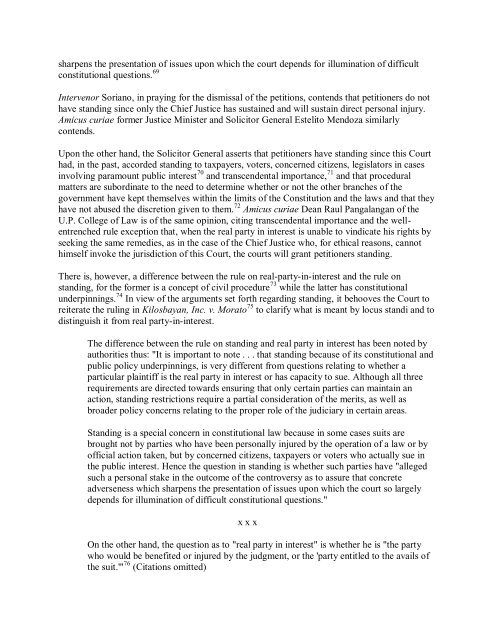Republic of the Philippines SUPREME COURT Manila ... - Columba.us
Republic of the Philippines SUPREME COURT Manila ... - Columba.us
Republic of the Philippines SUPREME COURT Manila ... - Columba.us
Create successful ePaper yourself
Turn your PDF publications into a flip-book with our unique Google optimized e-Paper software.
sharpens <strong>the</strong> presentation <strong>of</strong> issues upon which <strong>the</strong> court depends for illumination <strong>of</strong> difficult<br />
constitutional questions. 69<br />
Intervenor Soriano, in praying for <strong>the</strong> dismissal <strong>of</strong> <strong>the</strong> petitions, contends that petitioners do not<br />
have standing since only <strong>the</strong> Chief J<strong>us</strong>tice has s<strong>us</strong>tained and will s<strong>us</strong>tain direct personal injury.<br />
Amic<strong>us</strong> curiae former J<strong>us</strong>tice Minister and Solicitor General Estelito Mendoza similarly<br />
contends.<br />
Upon <strong>the</strong> o<strong>the</strong>r hand, <strong>the</strong> Solicitor General asserts that petitioners have standing since this Court<br />
had, in <strong>the</strong> past, accorded standing to taxpayers, voters, concerned citizens, legislators in cases<br />
involving paramount public interest 70 and transcendental importance, 71 and that procedural<br />
matters are subordinate to <strong>the</strong> need to determine whe<strong>the</strong>r or not <strong>the</strong> o<strong>the</strong>r branches <strong>of</strong> <strong>the</strong><br />
government have kept <strong>the</strong>mselves within <strong>the</strong> limits <strong>of</strong> <strong>the</strong> Constitution and <strong>the</strong> laws and that <strong>the</strong>y<br />
have not ab<strong>us</strong>ed <strong>the</strong> discretion given to <strong>the</strong>m. 72 Amic<strong>us</strong> curiae Dean Raul Pangalangan <strong>of</strong> <strong>the</strong><br />
U.P. College <strong>of</strong> Law is <strong>of</strong> <strong>the</strong> same opinion, citing transcendental importance and <strong>the</strong> wellentrenched<br />
rule exception that, when <strong>the</strong> real party in interest is unable to vindicate his rights by<br />
seeking <strong>the</strong> same remedies, as in <strong>the</strong> case <strong>of</strong> <strong>the</strong> Chief J<strong>us</strong>tice who, for ethical reasons, cannot<br />
himself invoke <strong>the</strong> jurisdiction <strong>of</strong> this Court, <strong>the</strong> courts will grant petitioners standing.<br />
There is, however, a difference between <strong>the</strong> rule on real-party-in-interest and <strong>the</strong> rule on<br />
standing, for <strong>the</strong> former is a concept <strong>of</strong> civil procedure 73 while <strong>the</strong> latter has constitutional<br />
underpinnings. 74 In view <strong>of</strong> <strong>the</strong> arguments set forth regarding standing, it behooves <strong>the</strong> Court to<br />
reiterate <strong>the</strong> ruling in Kilosbayan, Inc. v. Morato 75 to clarify what is meant by loc<strong>us</strong> standi and to<br />
distinguish it from real party-in-interest.<br />
The difference between <strong>the</strong> rule on standing and real party in interest has been noted by<br />
authorities th<strong>us</strong>: "It is important to note . . . that standing beca<strong>us</strong>e <strong>of</strong> its constitutional and<br />
public policy underpinnings, is very different from questions relating to whe<strong>the</strong>r a<br />
particular plaintiff is <strong>the</strong> real party in interest or has capacity to sue. Although all three<br />
requirements are directed towards ensuring that only certain parties can maintain an<br />
action, standing restrictions require a partial consideration <strong>of</strong> <strong>the</strong> merits, as well as<br />
broader policy concerns relating to <strong>the</strong> proper role <strong>of</strong> <strong>the</strong> judiciary in certain areas.<br />
Standing is a special concern in constitutional law beca<strong>us</strong>e in some cases suits are<br />
brought not by parties who have been personally injured by <strong>the</strong> operation <strong>of</strong> a law or by<br />
<strong>of</strong>ficial action taken, but by concerned citizens, taxpayers or voters who actually sue in<br />
<strong>the</strong> public interest. Hence <strong>the</strong> question in standing is whe<strong>the</strong>r such parties have "alleged<br />
such a personal stake in <strong>the</strong> outcome <strong>of</strong> <strong>the</strong> controversy as to assure that concrete<br />
adverseness which sharpens <strong>the</strong> presentation <strong>of</strong> issues upon which <strong>the</strong> court so largely<br />
depends for illumination <strong>of</strong> difficult constitutional questions."<br />
x x x<br />
On <strong>the</strong> o<strong>the</strong>r hand, <strong>the</strong> question as to "real party in interest" is whe<strong>the</strong>r he is "<strong>the</strong> party<br />
who would be benefited or injured by <strong>the</strong> judgment, or <strong>the</strong> 'party entitled to <strong>the</strong> avails <strong>of</strong><br />
<strong>the</strong> suit.'" 76 (Citations omitted)


